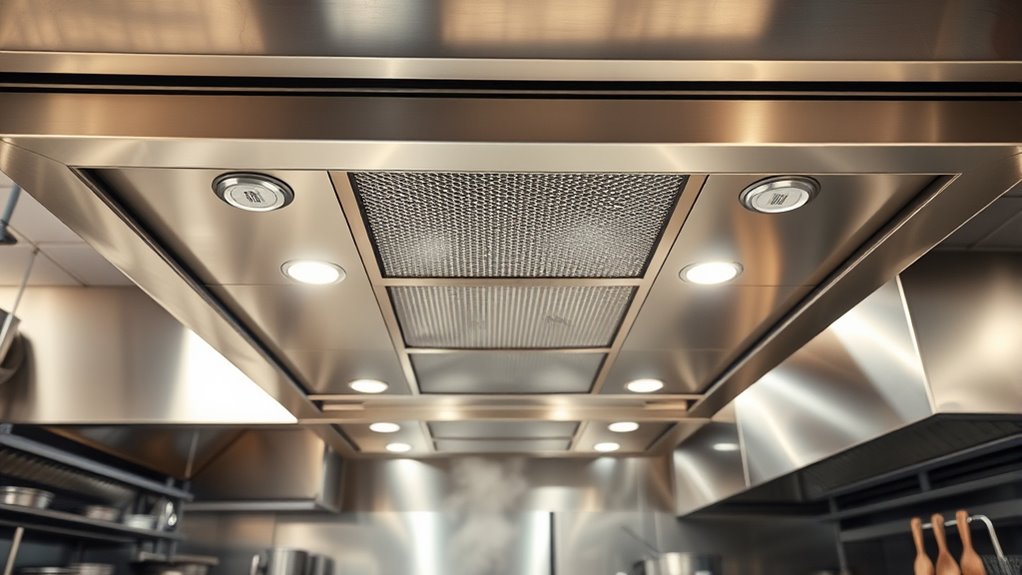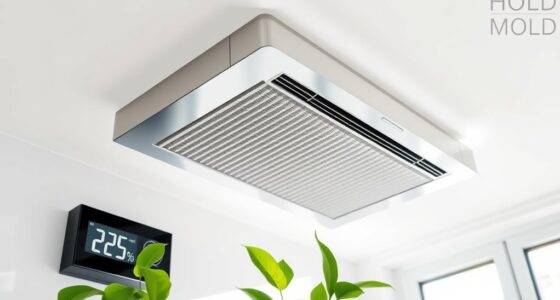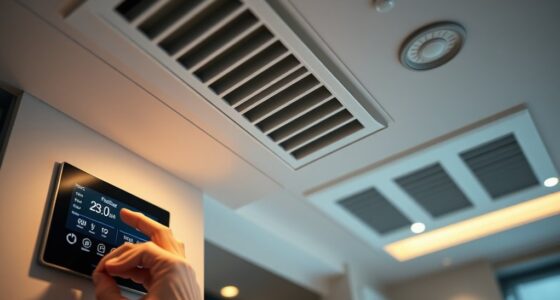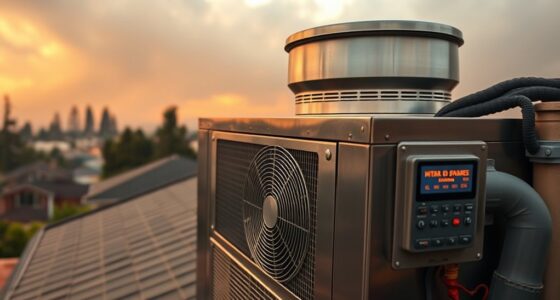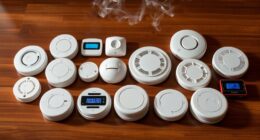In commercial kitchens, you need to guarantee your air filtration system effectively captures grease particles, odors, and airborne contaminants. This involves using high-quality exhaust hoods with properly maintained filters and vents that direct air outside. Regulations specify minimum airflow rates and maintenance schedules to keep the system efficient and compliant. Regular inspections and filter replacements are essential to prevent hazards and maintain air quality. For detailed guidelines to optimize your kitchen’s ventilation, continue exploring how these requirements work together.
Key Takeaways
- Commercial kitchens require exhaust hoods with filters to trap grease and neutralize odors effectively.
- Air filtration systems must meet local building codes and health regulations for airflow and safety.
- Regular maintenance of filters, including grease traps and activated carbon, is essential for optimal performance.
- Properly designed exhaust vents direct air outside, preventing recirculation and odor dispersion indoors.
- Adequate ventilation ensures removal of airborne contaminants, improving air quality and reducing health hazards.
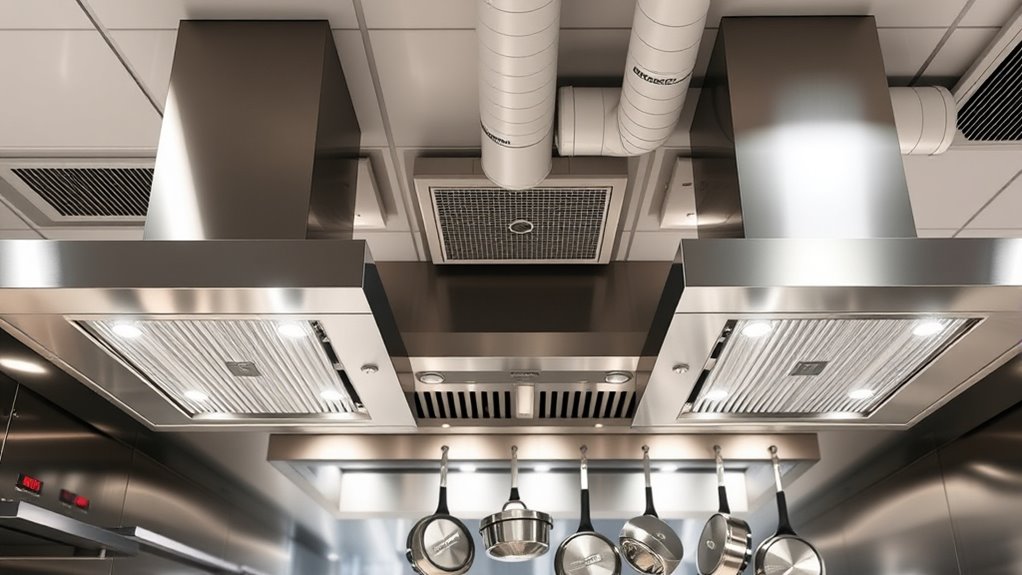
Maintaining clean air in commercial kitchens is essential for both health and safety, especially since cooking processes generate smoke, grease, and odors that can quickly compromise air quality. To guarantee a safe environment, you need to follow proper ventilation standards that are designed to handle the unique demands of commercial cooking spaces. These standards specify the amount of airflow required to remove airborne contaminants effectively and maintain a safe indoor environment. When your ventilation system meets these standards, you reduce the risk of smoke buildup, excess heat, and airborne grease particles that can impair visibility and create slip hazards. Proper ventilation also minimizes the spread of airborne bacteria and other pathogens, which is critical for food safety and sanitation.
Odor control is another essential aspect of maintaining a healthy kitchen atmosphere. Without effective odor management, lingering smells can permeate the space, making it uncomfortable for staff and customers alike. Ventilation systems equipped with high-quality exhaust hoods and filters play a key role in controlling odors. These systems capture and remove cooking fumes before they disperse into the dining or work areas. To optimize odor control, you should choose hoods that are appropriately sized for your cooking equipment and ensure they are regularly maintained. Filters, such as grease filters and activated carbon filters, trap grease particles and neutralize odors, preventing them from escaping into the environment. Proper placement of exhaust vents is also essential to maximize airflow efficiency and ensure that odors are directed outside, rather than recirculating within the kitchen.
In addition to installing the right equipment, you must adhere to local building codes and health regulations that specify ventilation requirements for commercial kitchens. These regulations often outline minimum airflow rates, filter maintenance schedules, and the need for backup systems in case of equipment failure. Regular inspections and maintenance are crucial for keeping your ventilation system functioning at peak performance. Dirty filters and clogged vents reduce airflow and compromise odor control, leading to poor air quality and potential health hazards for your staff. Investing in high-quality air filtration systems and staying compliant with ventilation standards ensures your kitchen remains a safe, odor-free environment where staff can work efficiently and customers can enjoy their dining experience without unpleasant smells or airborne pollutants.
Frequently Asked Questions
How Often Should Air Filters Be Replaced in Commercial Kitchens?
You should replace air filters in your commercial kitchen every 1 to 3 months, depending on usage and filter type. Keep to a regular maintenance schedule to guarantee peak air quality and equipment efficiency. Check filters frequently for dirt and buildup; if they look dirty sooner, replace them sooner. Proper filter replacement is essential to prevent grease buildup, maintain proper ventilation, and comply with safety standards.
Are There Specific Air Filtration Standards for Different Types of Cuisine?
Think of your kitchen as a vibrant orchestra, where each cuisine plays its own tune. You should consider cuisine-specific filtration to match these melodies, ensuring cultural culinary standards are met. For example, Asian cuisines with smoky stir-fries may need advanced filters, while lighter Mediterranean dishes might require less. Tailoring your air filtration system helps keep air quality ideal, preserving authenticity and safety across diverse culinary performances.
What Are the Energy Efficiency Considerations for Air Filtration Systems?
You should consider energy consumption when choosing air filtration systems, as it impacts operational costs. Opt for advanced filtration technology that balances efficiency with performance, reducing energy use without sacrificing air quality. Regular maintenance ensures filters operate effectively, saving energy. Additionally, look for systems with energy-efficient features like variable speed fans or smart controls, which help lower overall energy consumption while maintaining a clean and safe kitchen environment.
Can Air Filtration Improve Odor Control in Open Kitchen Layouts?
You can definitely improve odor control in open kitchen layouts with air filtration. While some might think filtration alone isn’t enough, combining odor absorption with increased air exchange effectively reduces lingering smells. High-quality filters capture airborne particles and odors, making the environment more pleasant. Don’t overlook the importance of proper ventilation, as it enhances filtration’s effectiveness by continuously replacing stale air with fresh, clean air.
How Does Humidity Affect Air Filtration Effectiveness in Commercial Kitchens?
Humidity impact can substantially reduce filtration efficiency in your commercial kitchen. When humidity levels are high, moisture clogs filters and encourages mold growth, making air filtration less effective. Conversely, low humidity can cause particles to become airborne more easily, challenging your filtration system. To maintain ideal performance, you should control humidity levels and regularly replace or maintain your filters, ensuring consistent air quality and odor control.
Conclusion
By implementing proper air filtration, you create a shield that keeps your commercial kitchen’s air invigorating and safe. Think of it as a vigilant guardian standing guard against grease, smoke, and odors, ensuring a healthier environment for your staff and patrons. Prioritizing these requirements isn’t just about compliance—it’s about setting the stage for a spotless, inviting space where every inhalation you take is a breath of fresh energy.
